Titandeath Read online
Page 7
Hanto let out a belligerent chuckle.
‘Forward!’ he said, shouting into his vox pick up. ‘Forward for House Procon Vi! Unto the fire! Unto the hunt! Legio first!’
The Knights were shouting their battlecries through their machines. No one could hear outside of the suits, for the whole drop-ship was depressurised, ready for vacuum operations, but it mattered not at all. House Vi’s voxnet roared with aggression.
‘Forward!’ he bellowed. Transit clamps fell away from the Knight’s feet, waist and shoulders. Swivel doors opened at the rear of the sanctuary pod.
The throne chute allowed the Knights to join with their warsuits quickly once the drop-ships were on the ground, and so range out ahead of their Titan masters. The forward doors of the Knight pods opened into the drop-ship itself, but this time, Hanto was heading up. His hands twitched with phantom nerve impulses as he urged his machine backwards through the rear doors. Pivoting gracefully, he moved towards a simple, square lifter platform.
All along the edge of the Gallery Transcendent, numbered cylinders hatched with hazard stripes swivelled open, and the Knights of House Procon Vi strode out. Ever critical, Hanto thought the effect would have been better had they emerged in perfect unison, but even with the cylinders opening out of sequence and the Knights taking to their lifters in their own time, it was an impressive sight. In every drop-ship docking arm the same thing would be happening. Hanto checked in with the lance leaders of the other Knightly banners to ensure all was going to plan. He wished he were already outside on the ramparts, where he could see the hundred Knights of Procon Vi rise up and take to their defensive positions, but it was a spectacle for the enemy to enjoy. He determined to make their entrance as impressive as possible. The very least they could do was arrive more or less together.
‘House Procon Vi, rise!’ he commanded.
Five score chimes rang in his helm in acknowledgement. His Knight’s knees bent with sudden, grav-impelled acceleration as the lifters rose, bearing the Knights of House Procon Vi to the battlements of Legio Solaria’s floating fortress.
The lifter coasted to a gentle stop. Gravity shifted treacherously. A weightless Knight was easily toppled. Mass, not weight, was the deciding factor in any damage it would take should it fall.
‘To the walls!’ Hanto commanded.
Red lights flashed around the lifter portals and the doors cracked open on starkly lit battlements. Void shield discharge and explosions flickered conflicting patterns of light into the shaft.
Hanto stepped out onto the battlements of the Tantamon. The first step was light and unsteady, but as Falcon’s foot passed the threshold he felt his centre of gravity shift over the grav-plated wall-walk, and the claw toes clanged onto the deck with reassuring solidity.
The Knights of House Procon Vi emerged and took up their positions along the battlement. Crenellations as tall as ten men lined the ramparts on both sides, protecting a wall-walk wide enough for a pair of Knights to pass each other. Gates opened in the base of the towers that broke up the length of the parapet to let the Knights through to their stations. Through the temporary tunnel, Hanto saw other lances moving to the firing platform set into embrasures in the battlement. On the other arm of the Tantamon’s H and on the bottom of the ship a similar muster was under way. Scores of his house manned the walls. He took up his own position.
In a fight like this, his warriors needed little ordering. Each was a master of warfare in his own right, even away from open battle and the complexities of formation change, redeployment and darting attacks that were a Knight banner’s forte. They waited patiently, without fear, on the top and bottom of the ship. Hanto need not say anything. He spoke nevertheless, his voice carrying to all the hundred aboard the Tantamon, and across the void to the seventy upon Artemisia.
‘Knights of House Procon Vi, stand firm.’
By now, his mind was enmeshed with that of Falcon. He saw out of its eyes. The restlessness that possessed him between engagements was gone; he experienced a sort of savage contentment within the mind impulse link. He was a hound, tensed, alert, ready to be released.
For the moment there was little for his Knights to do. The void shields of the Tantamon were multiply layered. They would hold against a bombardment of this magnitude for hours. As yet, no strike craft came against the walls.
Falcon’s head turned under its armoured cowl at Hanto’s unspoken command. Through its false eyes Hanto watched the moon of Iridium and its attendant orbitals rush towards him through the void. Theta-Garmon V brooded behind, half its striped bulk softly shadowed, the other glaring in the light of the sun. In the airless void there was no sound from outside save that conveyed by direct vibration in the ship’s fabric, so his hearing was full of the ticks, bleeps, whirs and whines of the systems working within his warsuit. As a sleeper on a silent night becomes entranced by the strange, organic noises emanating from his body, so Hanto drifted into the mechanical life of his fighting machine. Bereft of outside stimulation, his organic senses intruded over his Knight’s input, and he led a doubled existence, simultaneously a man and an iron giant. Some found this sensation led to dislocation. But it fascinated him. He explored it.
An urgent beeping broke his reverie. A gridded vector map superimposed itself over his field of vision. Pulsing red dots raced towards the Tantamon.
‘Assault craft, incoming, all vectors. Prepare to repel boarders!’ he commanded.
As he gave the order, his machine vision caught sight of the attackers as glints in the storm of war, steadier lights against explosions and writhing void shield activity. The bombardment suddenly dropped off on most of the shield, but intensified on the forward left. Shells burst; blinding spheres of atomic fire flattened themselves on the aegis, linking up, subsuming shield aurorae into their violent blaze. The hits became a rolling wall of fire.
More chimes sounded in Hanto’s mind. The void screen was coming down, individual shields dropping one after another. The last shield burst with a display of purple lightning so intense it outshone the destructive forces that brought it down. A last couple of hits brought a few more discharges, then the bombardment ceased, and the approaching ships became easier to see. A swarm of darts arrowed for the gap in the shields. Somewhere, in the depths of the hull, burned-out generator coils would be in the process of being swapped out by giant machines and cohorts of specially modified crewmen. A Titan Legio could die in the void without firing a shot. Ship shields had to be raised fast when they were brought down.
Hanto reactivated his link with the Tantamon’s teeming cogitator network. Status screens for the vessel popped into life across his vision. He dismissed them all but for the shield matrix data screed. A counter ran down rapidly towards zero. The voids would not be raised in time to stop all the ships coming in to assault. Good, he thought. He welcomed the foe. His weapons stirred.
‘Stand by, my Knights!’ Hanto called. His Knight suit gave a challenge only it and Hanto could hear in the silent dark. Impulses raced to war-horns that could not sing without air, but all the Knights heard the call within their second, machine-made world. ‘They are coming!’
The glints grew. The first passed the limits of the aegis fields rapidly. In an eyeblink, half were through, jinking madly to avoid the Tantamon’s point defence fire. Several exploded, cored out by las-shot.
Range finders trilled excitedly in Hanto’s helm. His Knight shifted in anticipation. The trill became a clear note. The enemy were close enough that his warriors might hit them.
‘House Procon Vi, open fire!’
He himself was firing before he finished the order. The rapid-fire battle cannon on his right arm pumped out three-shot salvoes while rockets streaked out from his carapace-mounted array. His thermal cannon was not yet within focal range. Its machine-spirits clamoured like children denied a treat in their desire to shoot.
In the vacuum his shells were
silver streaks. He tracked an assault ship across the void, hammering it with explosions. A missile hit from his storm spear pod broke the ship’s back, and it came apart into fragments, spilling bodies and brief flames into the void. He shouted with triumph. All along the wall the Knights were swinging their huge, ponderous torsos, adding their fire to that of the ship. The counter in Hanto’s head reached zero, and the aegis flickered back into life. The stragglers of the attack swarm slammed into its surface, exploding on the newly raised shield screens, half their mass shunted into the warp in eruptions of blue and violet light.
By then, the foremost assault shuttles had made it to the ship. They were strange-looking craft. Several limpeted onto the hull, spread arms clamping them into place. Fusion fires flashed through gaps as they chewed their way into the hull of the Tantamon and its drop-ships. Ball-mounted lascannons hidden in the parapet’s machicolations came into action, sweeping the walls of the space-faring fortress free with flicker blasts of coherent light.
Those unlucky enough to land upon the tops of the drop-ships were easily picked off, but they were poor landings, and the majority were headed for the castle wall itself. The whole venture was practically suicide, but though desperate, a successful attack offered a great prize – the capture of a demi-Legio of god-machines. If the enemy took the wall, others could land upon the drop-ships unopposed, while the Knights’ lifters offered a way into the Tantamon itself.
An assault shuttle streaked past Hanto, out of control, engines firing wildly. It crash-landed to bounce along the wall-walk. Arms extended from its sides and drove mechanical claws like picks into the hull. They were torn off by the score, but the craft slowed, until finally it slammed to a halt. On its remaining limbs the ship rose up and scuttled forward, revealing itself as an oniscidari drop-tank. Panels slid aside to extrude plasma callivars, which immediately opened fire. The boarding ramp at the prow dropped, and out poured two dozen heavily armoured cyborgs of False Mechanicum skitarii. Hanto fired his thermal cannon down the throat of the passenger bay before the ramp could rise, obliterating the craft in a ball of blue fire, but it was only the first. Dozens more filled the void and crashed down onto the wall-walk.
The fight was as brutal as any feudal escalade. The Knights were tall, and powerful, and their weapons smashed apart the drop-tanks as soon as they landed, but the boarders were elite vanguard troopers in self-sustaining armours, numerous and wielding weapons of the deadliest kinds. These were no lowly tech-thralls, but a specialist void-clade of the highest specification.
One of the Knights near Hanto went down to a well-aimed fusillade of plasma fire. Searing beams overloaded its ion shields, and sliced into the vulnerable joints at the knees and elbows. One weapon fell limp; the other bounced off the parapet wall and floated away, free of the artificial gravity of the wall. The Knight fell backwards. Gas and flame vented from the cabin. The pilot’s screams rose in an agonised pitch before abruptly falling silent. The wall shook as the back of the Knight blew out, demolishing part of the parapet, and an expanding cloud of fire flung the Knight’s slayers about like leaves in the wind. Hanto leaned into it, ion shield swivelled front. When the blast cleared, several enemy drifted dead, but the majority recovered, rerouted their systems around their damaged bionics and pulsed their built-in void jets to return to the ship.
Hanto abandoned his position, turning his attention from the void to the wall-walk. The majority of the enemy had landed and were swarming over his warriors. Their assault shuttles-turned-crawl tanks fired lances of plasma from all angles. Hanto switched his own ion shields about rapidly to take the worst of the fire, but the enemy were everywhere and attacking everything, and the ion shield’s directional placement was a continuous set of compromises.
A Mechanicum war was not fought on the physical plane alone. Some of the assault ships carried machinery squirming with malevolent code instead of troops. Upon landing, they extended their limbs and crawled over the craft like ticks, antennae probing the hull in search of vulnerable data conduits. Where they found their targets, mandibles splayed, and adamantium-tipped probosces speared the metal, injecting optic pipes with a deadly cargo of ones and zeroes. Within the Tantamon’s infosphere loyal hunter killer spirits grappled with these invaders, while dedicated data-mages of the cyber-thaumaturgia formulated new avenues of defence against semi-daemonic scrapcodes. As the defenders adapted, the invaders fought back. Evolutions that would take millennia in an organic system took place in seconds.
Other craft carried microscopic machines that ate through metal and attacked systems more directly by severing cables and short-circuiting vital conduits. Again, the Tantamon had an answer. Beetle-bodied scavengers emerged from ducts and gathered up the tech-mites with high-power magnets and gravity hooks, breaking them down into their component parts for later use.
This was war of the most total kind. From machine-spirits through microscopic machine life to modified humans, all the way up to war engines many times taller than a man, all fought over the body of the ship.
In its own way, the Mechanicum fighting itself was more terrible than the burning of planets by the Legiones Astartes. A world’s rocks do not make war. The ship was a world, and the entirety of it was at war. Nothing was spared violence. All was drafted into the fight.
Hanto bulled his way through the press of the enemy, crushing boarders beneath his feet. Globules of blood and oil drifted into space. A breaching team were attacking one of the lifter gates with lascutters. As he passed, Hanto swivelled his warsuit’s torso and cut them down with a measured burst of heavy stubber fire.
The Tantamon shuddered under the unkindness of battle and sabotage. Another wave of attackers was coming in, preceded like the first by a heavy, shield-stripping bombardment. Beyond the shields the rest of the fleet was fighting. Black lightning scored the surface of space as the Metallo Mutandis targeted the enemy’s weapons emplacements upon the moon. Flights of destroyers and servitor-piloted combat craft blurred overhead, engaging False Mechanicum fighters escorting the second wave of boarders. All of Tantamon’s guns were firing. Behind Hanto’s position the macrocannons slung tank-sized shells towards the orbitals and their monitor ships. Las-fire interlaced in a deadly web across the crowded sky.
By now the battlement was a disorienting seethe of discharging weapons, swinging giants’ limbs and explosions, made all the more confusing by the Tantamon’s guns, the bombardment and the aegis’ response to it. Actinic light burst from multiple vectors, whiting out Falcon’s autosenses and throwing everything into hard relief.
In places the gravity plating was breaking down. Hanto had to watch his step. He couldn’t use his thermal cannon on the wall-walk, and even the battle cannon was a risk to the ship’s hull, but he had no close combat weapon like others, who swept away dozens of foes with every strike of their reaper chainswords or grabbed up scuttle tanks and crushed them in their gargantuan fists. The fortification could take a little friendly fire, he told himself, as he let off two shots into a knot of skitarii. Perfectly spherical explosions blasted them to nothing. Shrapnel passed around Hanto’s ion shield, pattering off his armour like rain.
Once more, Tantamon’s void banks winked out, and the second wave of enemy assault craft speared through the hole in the aegis, chased by flights of friendly interdiction craft. Though the servitor ships and Tantamon’s anti-fighter weapons took their toll, more of the second wave made it through now the Knights were occupied with the fight on the wall.
Hanto had no time to spare for the newcomers. He continued his struggle to clear the battlements. By the time he could pause and take stock, the second wave had come down, and they were attempting a different manner of entry.
All over the roofs of the drop-ships, traitor assault shuttles were clamping themselves to metal. Gunfire blazed from the wall cannons and the ships. A few of the craft disgorged their troops to form defensive perimeters around the craft and take down
the wall defences. These newcomers were of a different order again.
‘Thallaxii!’ he voxed. ‘Thallaxii and automata on the drop-ships! Heavy assets are assaulting the drop-ships!’
He grunted as he fired his thermal cannon, immolating a score of the enemy.
‘They are going for the Titans,’ he said.
The muster of Legio Solaria
Six
Combat Drop
The Titans had been brought up to combat-ready status well before the attack, the process beginning as soon as they arrived in-system. People looked to the size, might and weaponry of the god-machines as the signifiers of their power, but a Titan’s greatest weapon was the machine mind housed within, and the first part of a Legio’s process of war was to awaken them. The longer the period of activation, the better. A long period enabled all the rituals to be undertaken correctly, with the approved amounts of sacred oils, incense and other libations needed to ensure good function.
The crews were barred from the ceremonies. While the priests of the Cult Tigris undertook their duties, Esha Ani Mohana fretted outside the drop-ship. Always, she went to the loading bay portal set into the vast drop gates of the ships. It was the closest she could get during the ceremony.
She was never alone. Durana Fahl usually arrived before she did. Toza Mindev was another regular. Some of the moderati were usually present. The rest showed up as they wished. The thought of the machines coming to consciousness without being connected to them filled the crews with a sense of medical violation, as if it were their bodies that were being poked and prodded during the priests’ strange rituals. Because of the same feelings, some preferred to stay away.
The divide between human operator and metal giant was small, and grew smaller with every joining. The sense of disconnection out of battle was profoundly uncomfortable for some, and that also grew with every separation.

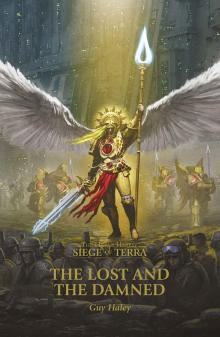 The Lost and the Damned (The Horus Heresy Siege of Terra Book 2)
The Lost and the Damned (The Horus Heresy Siege of Terra Book 2)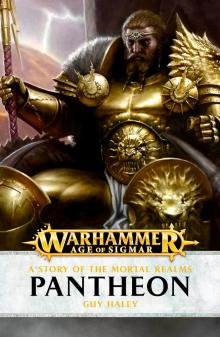 Pantheon
Pantheon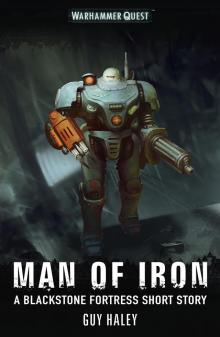 Man of Iron
Man of Iron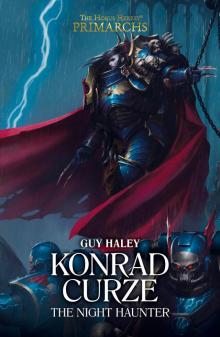 Konrad Curze the Night Haunter
Konrad Curze the Night Haunter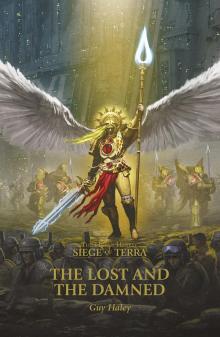 The Lost and the Damned
The Lost and the Damned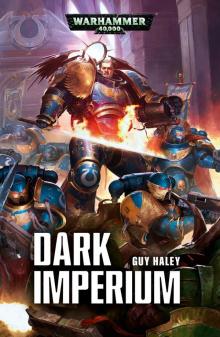 Dark Imperium
Dark Imperium Hoppo's Pies
Hoppo's Pies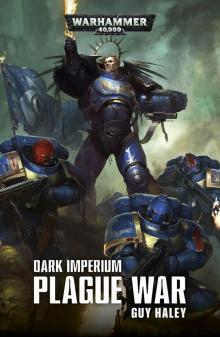 Dark Imperium: Plague War
Dark Imperium: Plague War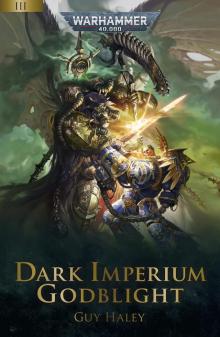 Dark Imperium: Godblight
Dark Imperium: Godblight Crash
Crash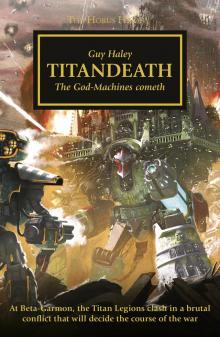 Titandeath
Titandeath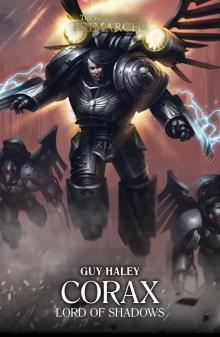 Corax- Lord of Shadows
Corax- Lord of Shadows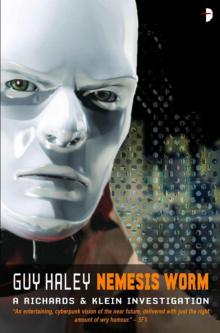 The Nemesis Worm
The Nemesis Worm Wolfsbane
Wolfsbane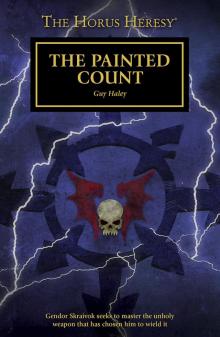 The Painted Count
The Painted Count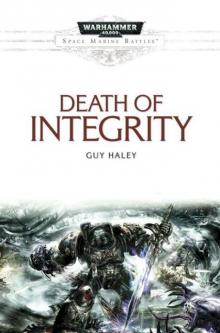 The Death of Integrity
The Death of Integrity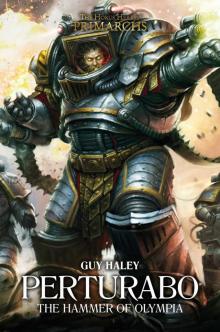 Perturabo: Hammer of Olympia
Perturabo: Hammer of Olympia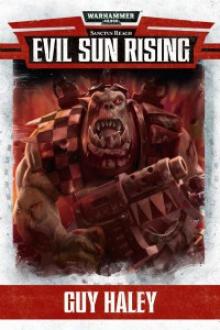 Evil Sun Rising
Evil Sun Rising The Emperor's Railroad
The Emperor's Railroad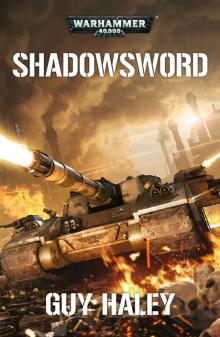 Shadowsword
Shadowsword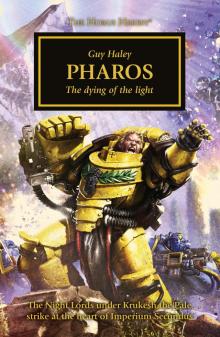 Pharos
Pharos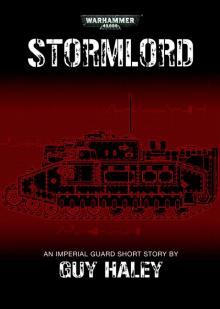 Stormlord
Stormlord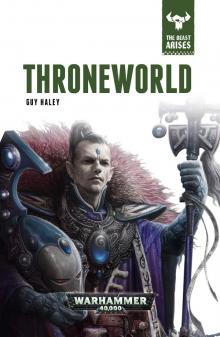 Throneworld
Throneworld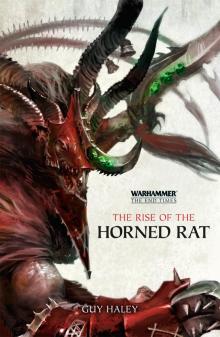 The End Times | The Rise of the Horned Rat
The End Times | The Rise of the Horned Rat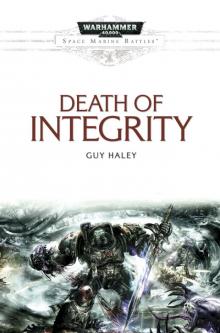 Death of Integrity
Death of Integrity Omega Point
Omega Point Omega point rak-2
Omega point rak-2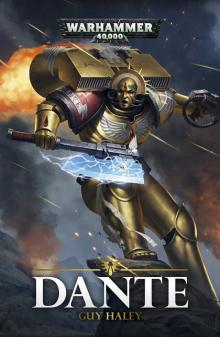 Dante
Dante The Ghoul King
The Ghoul King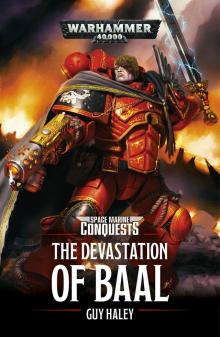 The Devastation of Baal
The Devastation of Baal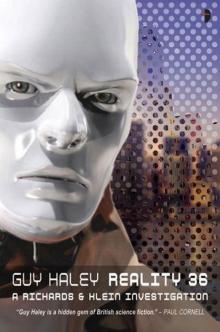 Reality 36: A Richards & Klein Novel
Reality 36: A Richards & Klein Novel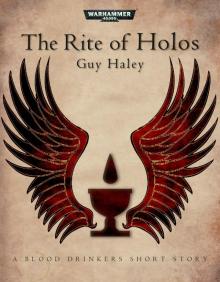 The Rite of Holos
The Rite of Holos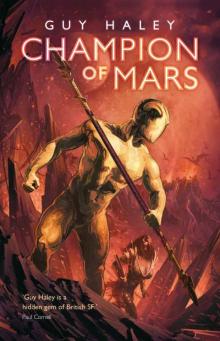 Champion of Mars
Champion of Mars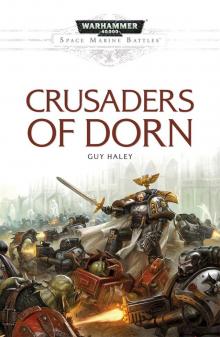 Crusaders of Dorn
Crusaders of Dorn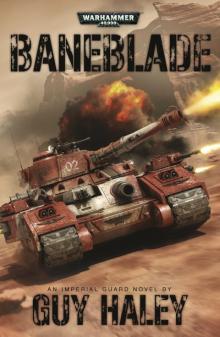 Baneblade
Baneblade